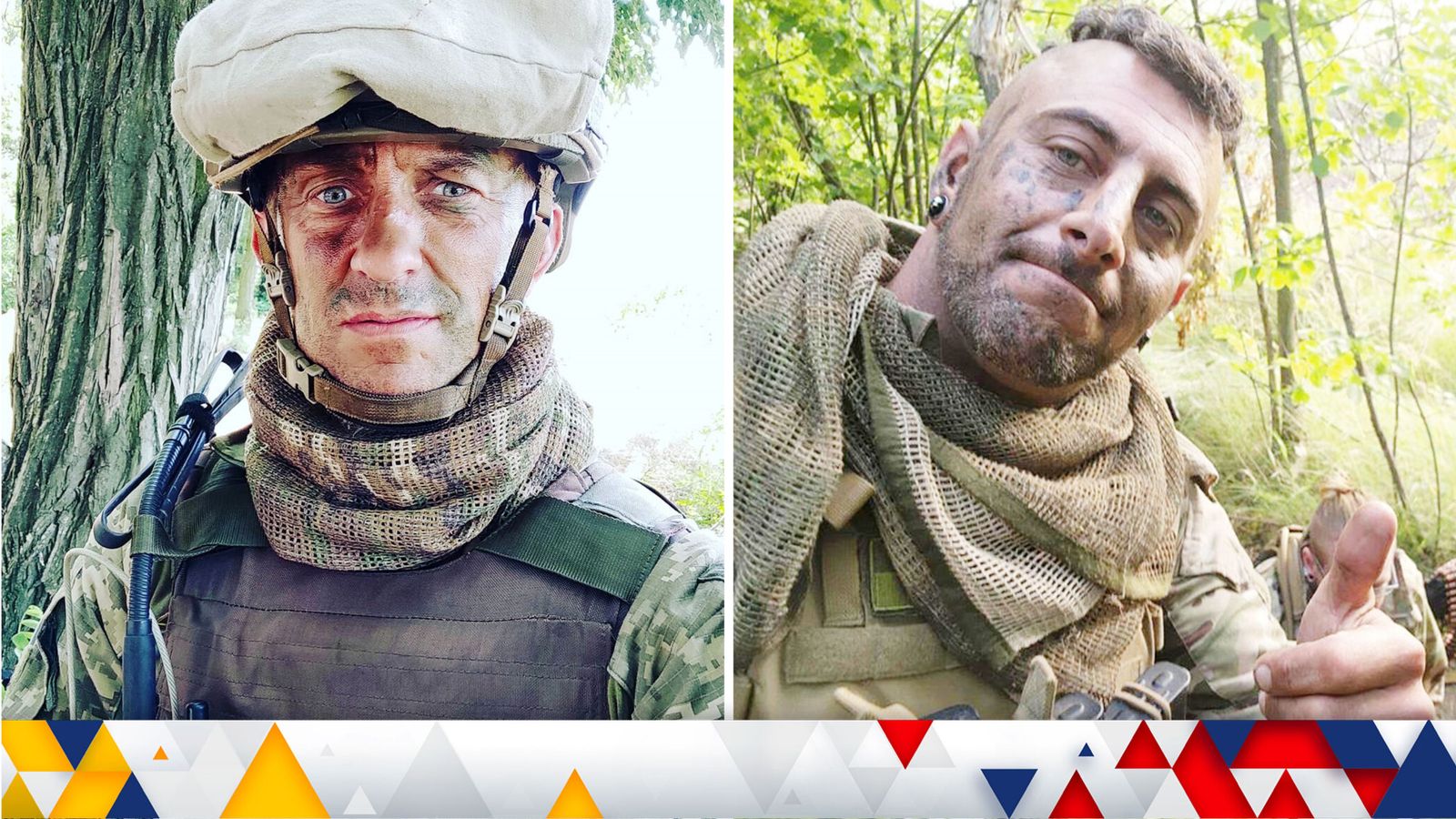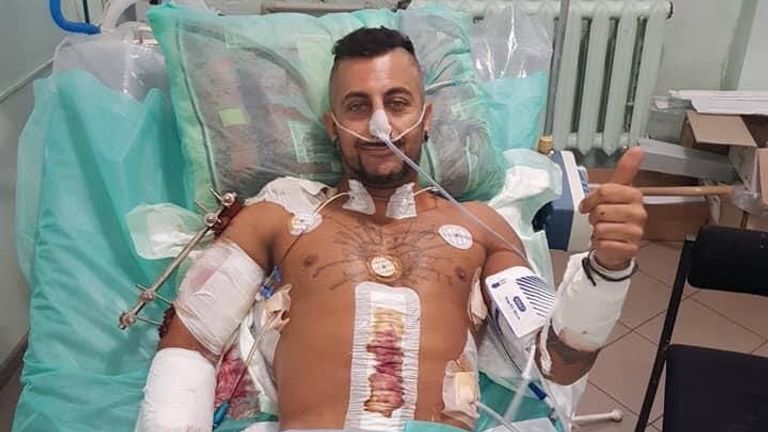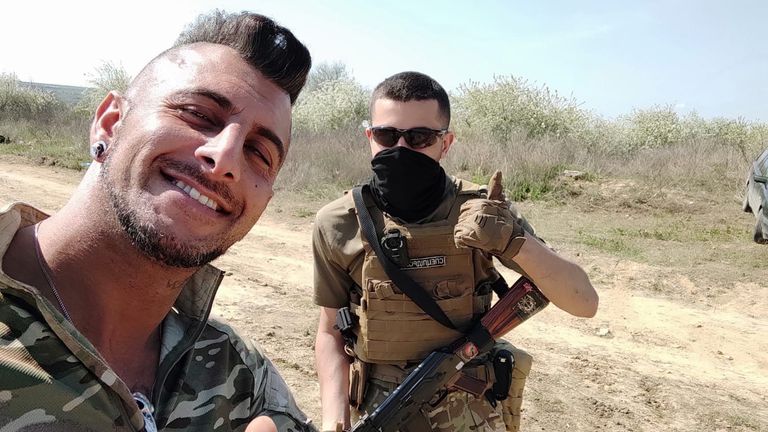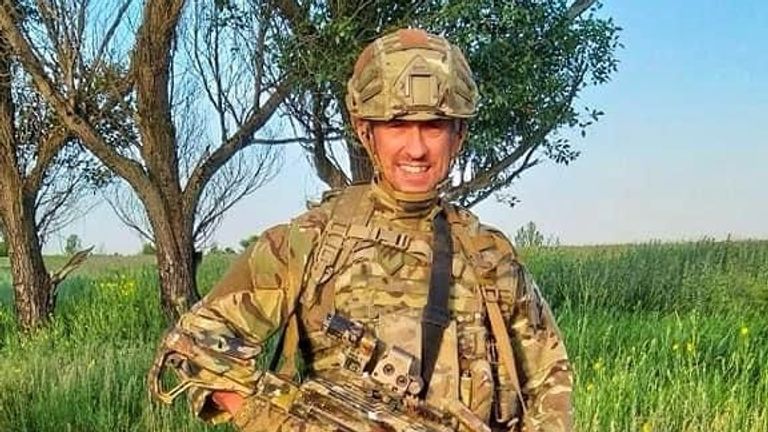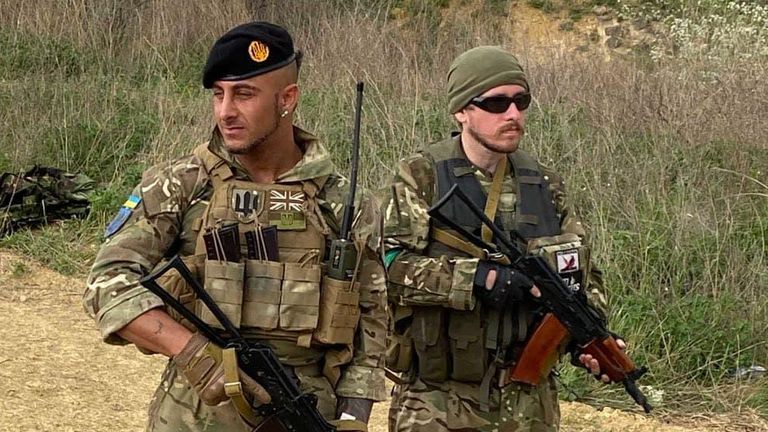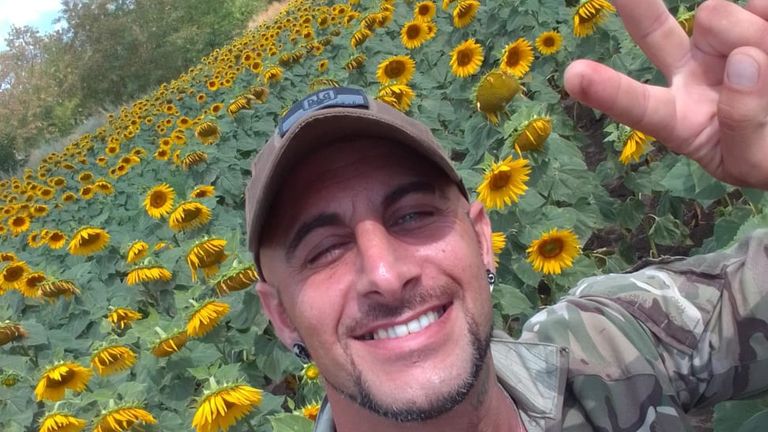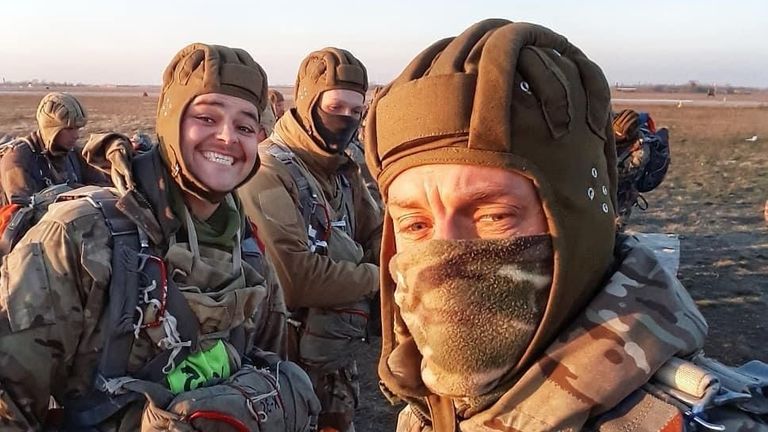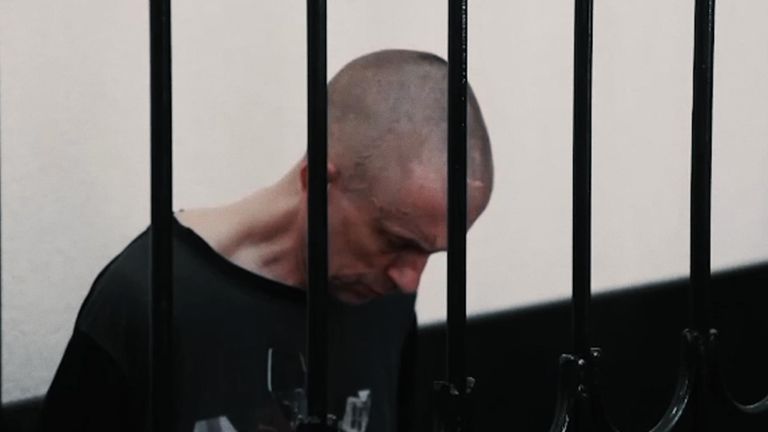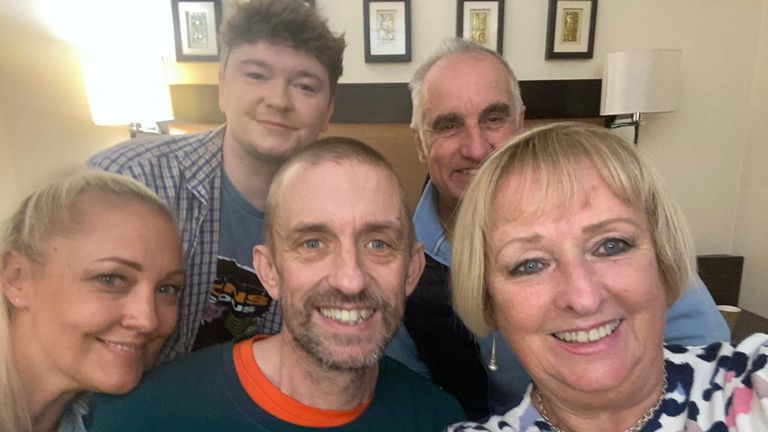Two Britons who nearly died fighting in Ukraine have told why they have returned to the war-torn country – and warn urgent help is needed on the frontline in the battle against Russia.
Shareef Amin was seriously wounded by Russian fire after answering President Volodymyr Zelenskyy’s call for foreigners to join the Ukrainian military in 2022.
The 41-year-old from Bristol lost part of his hand and his right leg was paralysed from the knee down. He also suffered punctured lungs and severe injuries to his shoulder and forearm.
Fellow Briton Shaun Pinner was captured and tortured by Russian forces after fighting alongside Ukrainian troops in 2022.
The 50-year-old from Hertfordshire was imprisoned for five months – during which time he said he was “electrocuted, starved, beaten… and stabbed” – before he was released in a prisoner swap.
Speaking just before the second anniversary of Russia’s invasion of Ukraine, Mr Amin and Mr Pinner told Sky News there is no prospect of an end to the war anytime soon – and fear Vladimir Putin will be free to invade more of Europe if urgent help isn’t sent.
“We need support – from Britain, America, Europe – whether it’s bombs, helmets, body armour, or medical equipment, there isn’t enough,” Mr Amin says.
“This is a really dangerous situation. If Russia gets the upper hand and they take Ukraine, they’re not going to stop at that.
“The British and the Europeans need to know this is all of our wars.”
Ukraine war:
Follow the latest updates
Mr Pinner says Ukraine is “probably a year off being able to produce enough shells to be able to support” itself.
“We’re going to go through a really tough time before then,” he adds.
“I’ve never lost faith that Ukraine can win. But we’ve got ammo shortages on the frontline that are a real worry. How can you fight with one hand tied behind your back?”
‘Chaotic’ first months in Ukraine
Mr Amin – who spent 13 years in the British military – says he travelled to Ukraine to join the fight against Russia in March 2022 after watching a speech by President Zelenskyy on Instagram.
“I managed to get hold of a group of British guys through WhatsApp and TikTok, and by 11 March we were in Lviv,” he says.
He described his first two months in the country as “chaotic” as he and others felt there wasn’t enough time to go to the British embassy and join the foreign legion through official channels.
“We almost got arrested three times at gunpoint, because we weren’t there under official paperwork – we just had passports, uniforms, and military kit,” he says.
Mr Amin says he initially decided to do some humanitarian work instead, delivering medical supplies around the country, until he was asked to teach one of the territorial units in Western tactics.
By mid-2022, Mr Amin was on the frontline but left after a few months to sign up officially to the Ukrainian military.
He went in search of more specialised work and joined the Main Directorate of Intelligence Unit (GUR) with some fellow Britons.
‘All of a sudden, there was this explosion’
On the frontline in November 2022, Mr Amin’s team was ambushed.
After his team found itself in a line of trees, beyond which there was nothing but flat land, “three or four tanks” emerged and began shooting – followed by artillery, drones and laser-guided missiles, he says.
He and other members of his team were hit. Some of them were killed.
“All of a sudden, there was this explosion,” he recalls.
“The air got sucked out of my lungs and all I could see was a flash of light and it felt like I was pulled underground like an empty can.”
‘He’s not going to make it’
Mr Amin says he was hit by a round of fire that had gone underground before exploding and ricocheting back up through his body armour.
When he eventually got to an ambulance and was taken to hospital, he heard a doctor say “he’s not going to make it” – but he survived despite more than 20 pieces of metal being pulled out of his back.
He spent six weeks in a hospital in Odesa, hoping to recover and quickly return to the frontline.
But he says: “You don’t really come to the realisation your body is destroyed.”
In December 2022, he was flown to the UK for further treatment – but went back to Ukraine in the summer of 2023.
He says he is working with intelligence units there and helping with medical evacuations on the frontline.
“Psychologically, I had to have that purpose again,” Mr Amin says.
“The idea of actually going home and giving up was a no-go.
“I’ve had my ups and downs, but the idea of coming back and still being able to wear the uniform has kept me sane.”
‘You can’t train for pain of torture and starvation’
Mr Pinner was already in Ukraine when Russia invaded on 24 February 2022.
Having spent nine years in the British Army, he had been living with his fiancée in Mariupol since 2018 and was serving in the Ukrainian military.
“I was on a routine deployment when the full-scale invasion happened,” he recalls.
Mr Pinner says he was the first foreigner to become a commander on the frontline as he spoke Russian and had previous military experience.
But in April 2022, he and four other British soldiers were captured and taken prisoner.
He was “electrocuted, starved, beaten, tortured, stabbed in the leg,” he tells Sky News, before being put on a show trial and sentenced to death in Russia’s self-proclaimed People’s Republic of Donetsk.
“I wasn’t expecting the brutality of it,” he says.
“You can’t train for pain. The worst torture was starvation… thinking about food – it’s with you every day, it’s still with me now.”
‘If I got executed, I was dying for a cause’
Mr Pinner says that the Russian he learned as a resident of Mariupol helped him to decipher what was going on during his captivity.
Reflecting on challenges he’d faced outside the military – such as relatives dying, and previous relationship breakdowns – helped keep things in perspective, he adds.
“I was never as low as that when I was in captivity, because I knew if I did get executed, I was dying for a cause,” Mr Pinner says.
He and the other four Britons were unexpectedly freed as part of a prisoner exchange in September 2022.
He was reunited with his family in the UK before returning to Ukraine to live with his wife the following month.
‘I don’t talk to Westerners who’ve just turned up’
Mr Pinner admits being “nervous coming across the border” for the first time after he was freed.
But he says: “My life has changed now. I’m not fighting but I’m helping in another capacity.
“I try to talk about what it’s actually like to live here – and what it was like before the invasion.
“I try to dispel Putin’s narratives on social media because I’m now in a position where I can say, ‘actually that’s not correct, because I’m here and I know’.”
Speaking from Dnipro, where he warns an air raid siren might interrupt the call, he says he discourages any foreigners he speaks to who say they want to come and fight.
“There are some good guys here,” he says. “But they’ve either been here a long time or they’re married to Ukrainians.”
He adds: “I don’t talk to Westerners who have just turned up. You don’t want people coming over who just want to update their YouTube.”
Read more:
Estonia’s volunteer army warns about Russia
Russia takes complete control of Ukrainian city
Was lack of ammo to blame for Russia taking Avdiivka?
Should the West provide more weapons to Ukraine?
Military analyst Sean Bell agrees with Mr Pinner’s view about Westerners joining the fight.
He stresses the Ukrainians have enough personnel already, and ex-soldiers from NATO countries fighting in a war NATO has refused to enter can cause problems.
Bell says there is even a problem with donating shells, as they encourage attritional warfare, “which generally favours the bigger side” – Russia.
He adds that while the West readily donated precision weapons, as well as long-range missiles and tanks at the start of the conflict, now the UK has “emptied its war chest” of the older, stockpiled equipment, and “it’s got to a stage where we’re not comfortable with giving any more”.
New weapons systems risk falling into the wrong hands and compromising security, he adds, so most focus has now fallen on the US, which is trying to get a $60bn (£47bn) military aid package through Congress.
But Bell warns: “If funding was the only issue, the EU has already promised that much. It’s about converting dollars into weapons. They’re built to order and that all takes years not weeks.”
Mr Amin has written a book about his experience in Ukraine, Freedom At All Costs: A British Veteran’s Experiences Of The War In Ukraine.
Mr Pinner has also written a book, Live. Fight. Survive. He also teaches English and gives talks to Ukrainian soldiers.
